

Caliph. The Caliph (Arabic: خليفة ḫalīfah/khalīfah) is the head of state in a Caliphate, and the title for the ruler of the Islamic Ummah, an Islamic community ruled by the Shari'ah.
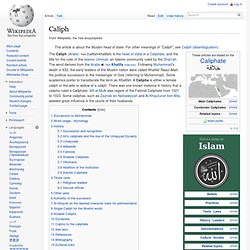
The word derives from the Arabic خليفة Khalīfa . Following Muhammad's death in 632, the early leaders of the Muslim nation were called Khalifat Rasul Allah, the political successors to the messenger of God (referring to Muhammad). Some academics prefer to transliterate the term as Khalīfah. A Calipha is either a female caliph or the wife or widow of a caliph. Succession to Muhammad[edit] In his book The Early Islamic Conquests (1981), Fred Donner argues that the standard Arabian practice at the time was for the prominent men of a kinship group, or tribe, to gather after a leader's death and elect a leader from amongst themselves. Sunni Muslims believe and confirm that Abu Bakr was chosen by the community and that this was the proper procedure. Sawm. Sawm (Arabic: صوم, plural: Siyam) is an Arabic word for fasting regulated by Islamic jurisprudence.
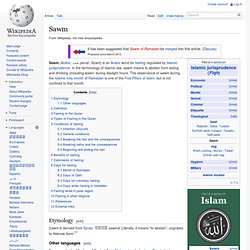
In the terminology of Islamic law, sawm means to abstain from eating and drinking (including water) during daylight hours. The observance of sawm during the Islamic holy month of Ramadan is one of the Five Pillars of Islam, but is not confined to that month. Etymology[edit] Ṣawm is derived from Syriac: ܨܘܡܐ ṣawmā. Literally, it means "to abstain", cognates to Hebrew tsom.[1] Other languages[edit] Definition[edit] Muslims are prohibited from eating, drinking and engaging in conjugal sexual relationships from dawn (fajr) to sunset (maghrib). Sawm also carries a significant spiritual meaning. Allah. Allah (English pronunciation: /ˈælə/ or /ˈɑːlə/; Arabic: الله Allāh, IPA: [ʔalˤˈlˤɑːh] ( )) is the Arabic word for God (literally 'the God', as the initial "Al-" is the definite article).[1][2][3] It is used mainly by Muslims to refer to God in Islam,[4] Arab Christians[5], and often, albeit not exclusively, by Bahá'ís, Arabic-speakers, Indonesian and Maltese Christians, and Mizrahi Jews.[6][7][8] Christians and Sikhs in Malaysia also use and have used the word to refer to God.
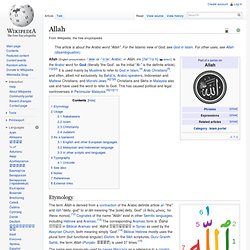
This has caused political and legal controversies in Peninsular Malaysia.[9][10][11] Etymology The name was previously used by pagan Meccans as a reference to a creator deity, possibly the supreme deity in pre-Islamic Arabia.[16][17] The concepts associated with the term Allah (as a deity) differ among religious traditions. There is a Unicode character for the word Allāh, ﷲ = U+FDF2.[23] Many Arabic type fonts feature special ligatures for Allah.[24] Usage Nabataeans Islam Some scholars[who?] Christianity Judaism. Dhimmi. A dhimmī (Arabic: ذمي ḏimmī IPA: [ˈðɪmmiː], collectively أهل الذمة ahl al-ḏimmah/dhimmah “the people of the dhimma”) is a historical[1] term referring to non-Muslim citizens of an Islamic state.[1] Dhimma allows rights of residence in return for jizyah - tax collected from non-muslims.[2] According to scholars, dhimmis had their rights fully protected in their communities, but as citizens in the Islamic state, had certain restrictions.[3] They were excused or excluded from specific duties assigned to Muslims, did not enjoy certain political rights reserved to Muslims, and were subject to payment of a special tax (jizyah), but were otherwise equal under the laws of property, contract and obligation.[4] Under sharia law, dhimmi status was originally applied to Jews, Christians, and Sabians.
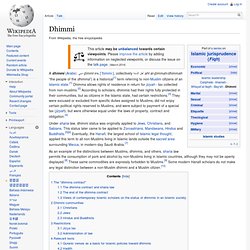
The "dhimma contract"[edit] Non-Muslims were allowed to engage in certain practices (such as the consumption of alcohol and pork) that were usually forbidden by Islamic law. Jizya. People of the Book. Five Pillars of Islam. The Five Pillars of Islam (arkān al-Islām أركان الإسلام; also arkān al-dīn أركان الدين "pillars of the religion") are five basic acts in Islam, considered mandatory by believers and are the foundation of Muslim life.
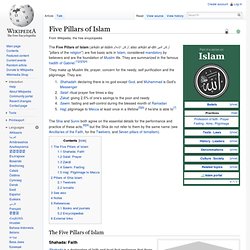
They are summarized in the famous hadith of Gabriel.[1][2][3][4] They make up Muslim life, prayer, concern for the needy, self purification and the pilgrimage. They are: